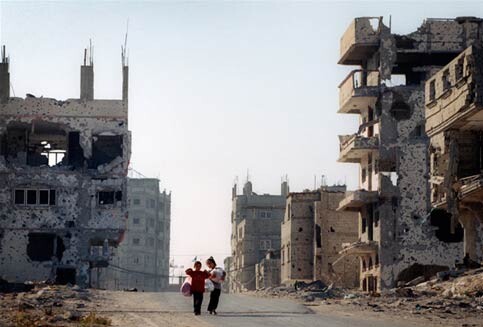Rafah, Gaza Strip 10 January 2004

Two children walk down a street pounded by Israeli shells in Gaza. (Johannes Abeling)
Oh goodness, I went to the souq (“market”) today with Mahmood’s mother. She woke me up at 8:30am instead of 6:00am while I lay in bed for two hours imagining the day to be later than it was, floating between nightmares and day dreams.
I dreamt the last group of internationals was back and the army invaded releasing a gas that contained an airborne type of AIDS and everyone in several blocks of Yibneh died instantly and we were not there with them. So we went to the hospital and I tried to explain in broken Arabic what we were there to investigate, afraid all the time of anything in the air, breaking from inside to see the dead people filling the halls, and Noah, being Noah, interrupted as I was taking a breath and explained the whole thing much more calmly and articulately, in translatable English.
At 6:00am the sky was sleeping still but had I woken up disoriented, sure it was another rainy day like the three days before, waiting for my laundry to dry every night as it hung on the roof soaking through. I curled up in bed and considered being elsewhere. At eight-thirty Im Mahmood woke me mid-dream and the day had become sunny.
So I got dressed and we walked out, Saturday morning 9:00am, sunshine painting the streets and the asbestos roofs and the mothers like sun-dried raisins elbowing their way to this or that stand to haggle over prices. She stopped me here at this jilbab or that jacket, announcing the prices so proud of a certain bargain you would think she herself was selling the goods this morning.
We climbed through piles of one-sheckel coats and glanced at pearly coffee cups and then all at once we were walking through the Yibneh souq, the damage still so fresh you’d think the army had invaded yesterday. The piles of rocks where homes had collapsed, the holes in the walls, the bent metal doors, the magnificent view of the collapsed four-story apartment against the Wall; the municipality workers digging ditches for a new water system.
And between the remnants of a neighborhood, merchants were still present, balancing their tables on the uneven dirt road which only weeks before had been one of the few paved roads in Rafah. It is a monument to the strength of people to continue even surrounded by death, a living dirge.
I followed Im Mahmood through the middle of the road. The dirt was covered with a thin layer of mud, people walking mazes to avoid the days-old rain puddles. Nobody smiled through the sickness of walking between these memories. In front of the bombed four-story building, Suad bought two beautiful new dressers for their new house and the men rode them away on donkey carts.
The family had moved into their new home and was sleeping there, with rooms for everyone and even one left empty and another left for me, such extravagance, but when I ask Im Mahmood about peace time, she answers indignantly, “Of course we’d be back at once to the old house. That’s our home.”
And in the new house, we watch from the warmth of the carpeted floors, the latest images of Israeli destruction on Palestinian TV, Nablus and Jenin mirror Yibneh — the nondescript rubble, the screaming grieving mothers, the injured being rushed to the hospital, and the soldiers with their guns pointed at children throwing stones. Im Mahmood is grading papers, and looks up for a minute at the sequence of filmed damage. “Ya’salaam, ya’salaam, and the world sleeps.” She returns to her grading. It’s a typical night.
Laura Gordon is a 20-year-old American Jew who came to Israel in December 2002 with the Birthright Israel program and proceeded, three months later, to begin work with the International Solidarity Movement in Rafah.




